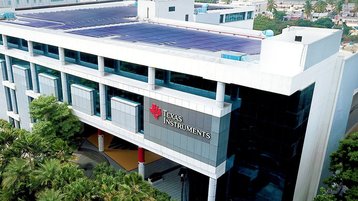The US Department of Commerce has signed a non-binding preliminary memorandum of terms with Texas Instruments that could see the company awarded $1.6 billion in CHIPS and Science Act funding.
The proposed funding would support Texas Instrument’s plans to invest $18bn in the construction of two fabs in Sherman, Texas, and one in Lehi, Utah.
The Sherman facilities are expected to produce 65nm – 130nm essential chips, with an anticipated daily production capacity of more than one hundred million wafers. The Lehi site will produce 28nm – 65nm analog and embedded processing chips, with an anticipated daily production capacity in the tens of millions.
Approximately 2,000 manufacturing jobs across the two states are expected to be created as a result of the investment. In addition to the direct funding, Texas Instruments also expects to receive up to $8bn in investment tax credits from the US Treasury Department, and an additional $10 million in funding for workforce development.
Under the terms of the agreement, Texas Instruments has committed to working with 40 community colleges, high schools, and military institutions across the US to help upskill employees, expand internship opportunities, and create pipeline programs with a focus on electronic and mechanical skills.
Childcare benefits including paid parental leave and an increase in child care services near the proposed facilities will also be offered by the company.
Headquartered in Dallas, Texas Instruments is a global leading manufacturer of analog and embedded processing semiconductors, specializing in the production of current-generation and mature-node chips used in power management integrated circuits, microcontrollers, amplifiers, and sensors.
“TI is expected to be an important part of the success of the Biden-Harris Administration’s work to revitalize semiconductor manufacturing and development in the US,” said US Secretary of Commerce Gina Raimondo.
“Our investments further strengthen our competitive advantage in manufacturing and technology as we expand our 300mm manufacturing operations in the US,” said Haviv Ilan, president and CEO of Texas Instruments.
“With plans to grow our internal manufacturing to more than 95 percent by 2030, we’re building geopolitically dependable, 300mm capacity at scale to provide the analog and embedded processing chips our customers will need for years to come.”
The $280bn CHIPS and Science Act was approved by Congress in July 2022, with $52bn of the overall funding package designated as subsidies for US semiconductor manufacturers. Funding from the act has also been earmarked for semiconductor R&D, growing a skilled semiconductor workforce, and incentives for the manufacturing of semiconductors and specialized tooling equipment.
In April, Raimondo said she expected all the grant money under the CHIPS Act to be allocated by the end of this year.
Companies that have so far been awarded funding under the Act include GlobalFoundries, Intel, TSMC, Samsung Electronics, Micron, SK Hynix, and GlobalWafers.







